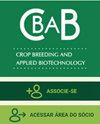基于Toler模型的新贝叶斯方法评价基因型的适应性和稳定性
IF 1.1
4区 农林科学
Q2 Agricultural and Biological Sciences
引用次数: 0
摘要
本研究旨在以前所未有的深度,将贝叶斯方法应用于Toler开发的非线性回归模型,以评估基因型的稳定性和适应性。在巴西中西部的21块土地上对25个大豆品种进行了评价。采用完整的块组设计,有3个重复。评价变量为粮食产量。提出的方法在R程序中通过BRugs包实现。该方法能够区分不同环境对大豆品种产量的影响,从而探索每种基因型对环境变化的反应。品种6266RSF、NS6990、GD19I435、GD19I439、GD19C443、RC0496和IA18661表现出较好的稳定性和一般适应性,是今后评价的推荐品种。其他品种对不利环境表现出特殊的适应性和较高的响应性。本文章由计算机程序翻译,如有差异,请以英文原文为准。
A new Bayesian approach to the Toler model for evaluating the adaptability and stability of genotypes
: This study aimed to apply, in unprecedented depth, a Bayesian approach to the non-linear regression model developed by Toler for evaluating the stability and adaptability of genotypes. Twenty-five soybean cultivars were evaluated in twenty-one plots across the midwestern of Brazil. A complete block design was employed, with three replications. The evaluated variable was grain yield. The proposed methodology was implemented in the R program by means of the BRugs package. The methodology was capable of differentiating the ef - fect of the environment on soybean cultivars in terms of yield in the different environments, allowing exploration of the response of each genotype to environ - mental variations. Cultivars 6266RSF, NS6990, GD19I435, GD19I439, GD19C443, RC0496 and IA18661 presented good stability and general adaptability, being the most recommended for future evaluations. The other cultivars presented specific adaptability and high responsiveness to unfavorable environments.
求助全文
通过发布文献求助,成功后即可免费获取论文全文。
去求助
来源期刊
CiteScore
2.40
自引率
13.30%
发文量
25
审稿时长
6-12 weeks
期刊介绍:
The CBAB – CROP BREEDING AND APPLIED BIOTECHNOLOGY (ISSN 1984-7033) – is the official quarterly journal of the Brazilian Society of Plant Breeding, abbreviated CROP BREED APPL BIOTECHNOL.
It publishes original scientific articles, which contribute to the scientific and technological development of plant breeding and agriculture. Articles should be to do with basic and applied research on improvement of perennial and annual plants, within the fields of genetics, conservation of germplasm, biotechnology, genomics, cytogenetics, experimental statistics, seeds, food quality, biotic and abiotic stress, and correlated areas. The article must be unpublished. Simultaneous submitting to another periodical is ruled out. Authors are held solely responsible for the opinions and ideas expressed, which do not necessarily reflect the view of the Editorial board. However, the Editorial board reserves the right to suggest or ask for any modifications required. The journal adopts the Ithenticate software for identification of plagiarism. Complete or partial reproduction of articles is permitted, provided the source is cited. All content of the journal, except where identified, is licensed under a Creative Commons attribution-type BY. All articles are published free of charge. This is an open access journal.

 求助内容:
求助内容: 应助结果提醒方式:
应助结果提醒方式:


